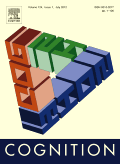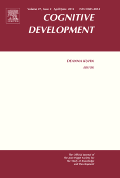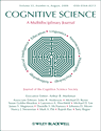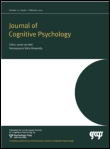
Cognition
Scope & Guideline
Fostering Interdisciplinary Collaboration in Cognition
Introduction
Aims and Scopes
- Cognitive Control and Executive Functioning:
Research focusing on how cognitive control mechanisms and executive functions operate, particularly in relation to various tasks, stressors, and individual differences. - Neurocognitive Mechanisms:
Investigations into the neural substrates underlying cognitive processes, including studies utilizing advanced neuroimaging techniques like fMRI and EEG to map brain activity. - Developmental and Lifespan Perspectives:
Exploration of cognitive development across different age groups, including studies on children, adolescents, and older adults, emphasizing how cognitive abilities evolve. - Clinical and Neuropsychological Insights:
Examination of cognitive impairments and their relationships with neurological conditions, mental health issues, and the implications for treatment and rehabilitation. - Social Cognition and Interaction:
Studies that delve into how social contexts and interactions influence cognitive processes, including aspects of empathy, decision-making, and group dynamics. - Learning and Memory:
Research into the mechanisms of learning and memory, including the effects of experience, context, and training on cognitive performance.
Trending and Emerging
- Interdisciplinary Approaches to Cognition:
There is an increasing trend towards integrating insights from various disciplines, including neuroscience, psychology, and even fields like music and art, to enrich our understanding of cognitive processes. - Impact of Physical Activity on Cognition:
Research focusing on the relationship between physical activity, exercise, and cognitive performance is gaining traction, highlighting the importance of lifestyle factors in cognitive health. - Neural Plasticity and Cognitive Training:
A growing interest in how cognitive training and interventions can induce neural plasticity and improve cognitive functions, particularly in clinical populations and aging adults. - Emotion-Cognition Interactions:
Studies examining how emotional states influence cognitive processes, including decision-making and memory retrieval, are becoming more prevalent, reflecting a more integrated view of cognition. - Advanced Neuroimaging Techniques:
The use of sophisticated neuroimaging methods, such as high-density EEG and fNIRS, is on the rise, facilitating a more nuanced understanding of cognitive processes and their neural correlates. - Social and Cultural Influences on Cognition:
Emerging research emphasizes the role of social and cultural contexts in shaping cognitive processes, highlighting the need for a more contextualized understanding of cognition.
Declining or Waning
- Traditional Neuropsychological Assessments:
Research centered around conventional neuropsychological tests appears to be less frequent, possibly due to a shift towards more dynamic and interactive assessments that better capture cognitive functioning in real-world contexts. - Static Models of Cognition:
There seems to be a decline in studies utilizing static or purely theoretical models of cognition, as researchers increasingly favor dynamic and integrative approaches that account for variability and contextual factors. - Focus on Isolated Cognitive Functions:
Research that examines cognitive functions in isolation, without considering their interconnections or the influence of external factors, is becoming less common, as the field moves towards more holistic and integrated perspectives.
Similar Journals

Cognitive Processing
Bridging theory and application in cognitive processes.Cognitive Processing, published by SPRINGER HEIDELBERG in Germany, is a leading journal dedicated to advancing the understanding of cognitive processes through interdisciplinary research. With its ISSN 1612-4782 and E-ISSN 1612-4790, the journal covers a diverse range of fields including Artificial Intelligence, Cognitive Neuroscience, and Experimental and Cognitive Psychology, making it an invaluable resource for researchers and professionals alike. While it currently does not operate under an Open Access model, it is well-regarded within the academic community, holding a respectable impact factor and ranking in the Q2 and Q3 quartiles as of 2023. The journal aims to foster innovation and collaboration among scholars, presenting high-quality original research, reviews, and theoretical discussions that bridge the gap between cognitive science and its practical implications. With a convergence of research from 2005 to 2024, Cognitive Processing continues to play a critical role in the evolving landscape of cognitive science literature.

COGNITIVE DEVELOPMENT
Innovating Insights into Child and Adolescent DevelopmentCognitive Development is a prestigious academic journal published by Elsevier Science Inc, focusing on the critical area of developmental and cognitive psychology. With an ISSN of 0885-2014 and an E-ISSN of 1879-226X, this journal serves as a vital platform for the dissemination of innovative research, theories, and methodologies from 1986 to the present, with the latest articles contributing to a comprehensive understanding of cognitive processes in children and adolescents. Positioned in the second quartile (Q2) of both the Developmental and Educational Psychology and Experimental and Cognitive Psychology categories, Cognitive Development holds an essential place in shaping contemporary psychological research, boasting robust Scopus rankings of #175/360 and #90/165 in its respective fields. Though not an open-access journal, it provides valuable insights and rigorous studies essential for researchers, professionals, and students engaged in the intricate processes of cognitive development. Whether you're looking to publish significant findings or simply stay updated on the latest advancements, Cognitive Development is an indispensable resource in the psychological community.

COGNITIVE SCIENCE
Bridging Disciplines to Illuminate Cognitive ProcessesCOGNITIVE SCIENCE, published by WILEY, is a leading academic journal that delves into the complexities of human cognition through an interdisciplinary lens. With an ISSN of 0364-0213 and an E-ISSN of 1551-6709, this journal has made significant strides in the field since its inception in 1977, ample coverage through to 2024, and a commendable Q1 and Q2 categorization in Experimental and Cognitive Psychology and Cognitive Neuroscience as of 2023. The journal is positioned at the intersection of various disciplines, ranking #65 out of 165 in Experimental and Cognitive Psychology and #58 out of 115 in Cognitive Neuroscience, highlighting its relevance and contribution to advancing knowledge in these areas. Although it does not offer open access, COGNITIVE SCIENCE remains an essential resource for researchers, professionals, and students seeking to explore groundbreaking research and theoretical insights within the vast domain of cognitive science.

LEARNING & BEHAVIOR
Shaping the Future of Learning and Behavioral ScienceLEARNING & BEHAVIOR is a distinguished academic journal published by SPRINGER that serves as a critical platform for the dissemination of research in the fields of behavioral neuroscience and cognitive psychology. With an ISSN of 1543-4494 and an E-ISSN of 1543-4508, this journal publishes high-quality, peer-reviewed articles that explore the complexities of learning processes and their behavioral implications. Despite its current Q4 status in Behavioral Neuroscience and Q3 in both Cognitive Neuroscience and Experimental and Cognitive Psychology, LEARNING & BEHAVIOR remains a valuable resource for researchers seeking to enhance their understanding of these dynamic fields. The journal has a converged publication timeline from 2003 to 2024, ensuring that it captures emerging trends and innovative methodologies. With robust accessibility options for a diverse readership, the journal fosters a comprehensive academic environment, inviting submissions that contribute to theoretical advancements and practical applications in understanding behavior. Authors and readers are encouraged to leverage this journal to engage with cutting-edge research that drives the behavioral sciences forward.

BRAIN AND COGNITION
Fostering Innovation in Cognitive ScienceBRAIN AND COGNITION, published by Academic Press Inc Elsevier Science, stands as a vital resource for researchers and practitioners in the realms of cognitive neuroscience and psychology. Established in 1982, the journal has continuously evolved, showcasing cutting-edge research that bridges the understanding of brain functions and cognitive processes up to 2024. With an impressive impact factor reflecting its commitment to high-quality scholarship, the journal currently holds a prestigious Q1 ranking in Arts and Humanities (miscellaneous) and notable Q2 rankings in various psychology fields, including Cognitive Neuroscience, Developmental and Educational Psychology, Experimental and Cognitive Psychology, and Neuropsychology. This multidisciplinary journal cultivates a rich academic dialogue, offering valuable insights to professionals, researchers, and students alike. Although it does not offer open access, its robust indexing in Scopus and consistent contribution to important discussions in cognitive research define its critical role in advancing knowledge and innovation in the cognitive sciences.

Language and Cognition
Exploring the Intersection of Language and MindLanguage and Cognition is a premier peer-reviewed journal published by Cambridge University Press, dedicated to advancing the fields of language, linguistics, and cognitive psychology. With an ISSN of 1866-9808 and E-ISSN of 1866-9859, it has rapidly established itself as a pivotal resource for researchers, educators, and practitioners alike. Recognized for its rigorous scholarship, the journal holds a Q1 ranking in Linguistics and Language and a Q2 ranking in Experimental and Cognitive Psychology for 2023, reflecting its esteemed positioning within the academic community. Since transitioning to open access in 2023, it has broadened its reach, making cutting-edge research accessible to a global audience. The journal's emphasis on interdisciplinary studies ensures a comprehensive exploration of the interactions between language and cognitive processes, fostering deeper insights and fostering collaboration across domains. Researchers and professionals looking to stay at the forefront of advancements in these vital areas will find Language and Cognition an invaluable platform for disseminating their findings and engaging with contemporary debates.

PSYCHOLOGIA
Exploring the Depths of Human BehaviorPSYCHOLOGIA is a distinguished academic journal published by the Psychologia Editorial Office, focusing on the broad field of psychology. Originating from Japan, the journal serves as a platform for innovative research and insights into various psychological phenomena, contributing significantly to the advancement of psychological knowledge since its establishment in 1996. With an ISSN of 0033-2852 and an E-ISSN of 1347-5916, PSYCHOLOGIA primarily targets researchers, professionals, and students who are passionate about the intricacies of human behavior and cognition. Currently categorized in the Q4 quartile of psychology (miscellaneous) based on 2023 metrics, it holds a Scopus rank of #157 out of 216, indicating its developing presence within the academic community. Despite being published without open access options, the journal remains committed to fostering scholarly dialogue and disseminating significant findings that shape contemporary psychological research. As it converges towards its issue set for 2024, PSYCHOLOGIA continues to be an essential resource for those seeking to deepen their understanding of psychological sciences.

Neuropsychological Trends
Unveiling the Trends Shaping Neuropsychological ResearchNeuropsychological Trends is a prominent, open-access journal published by LED EDIZIONI UNIV, based in Italy. Since its inception in 2007, the journal has dedicated itself to advancing research in the fields of neuropsychology and cellular neuroscience, catering specifically to the evolving trends shaping these disciplines. With the ISSN 1970-321X and an E-ISSN of 1970-3201, the journal provides a platform for multidisciplinary dialogue and exploration of neuropsychological phenomena. While ranked in the fourth quartile for both Cellular and Molecular Neuroscience and Neuropsychology and Physiological Psychology categories in 2023, the journal encourages innovative research that aims to enhance understanding and treatment of cognitive and psychological conditions. The convergence of years from 2011 to 2024 marks a significant period for contributions that inform clinical practice and theoretical frameworks. As researchers, professionals, and students engage with cutting-edge studies and reviews, Neuropsychological Trends serves as a vital resource for staying informed and fostering collaboration in the neuropsychological community.

JOURNAL OF COGNITIVE NEUROSCIENCE
Transforming knowledge of the brain into transformative insights.Welcome to the JOURNAL OF COGNITIVE NEUROSCIENCE, a premier publication in the field of cognitive neuroscience, published by the esteemed MIT PRESS. Since its inception in 1989, this journal has been at the forefront of advancing our understanding of the neural mechanisms underlying cognitive processes, boasting an impressive convergence period through 2024. With its Q1 ranking in the 2023 cognitive neuroscience category, it stands out among 115 peers, indicating its critical role in shaping contemporary research. The journal offers a comprehensive array of research articles, reviews, and methodologies aimed at researchers, professionals, and students alike, facilitating the exploration of complex cognitive functions. While not an open-access journal, it provides essential insights and significant contributions to the neuroscience community, making it an invaluable resource for anyone keen on delving into the intricacies of the human brain.

Journal of Cognitive Psychology
Pioneering the future of cognitive research.Journal of Cognitive Psychology is a premier peer-reviewed journal published by Routledge Journals, Taylor & Francis Ltd, located in the United Kingdom. With an ISSN of 2044-5911 and E-ISSN 2044-592X, this journal is dedicated to advancing the field of cognitive psychology by disseminating high-quality research findings and theoretical insights. Spanning from 2011 to 2024, the journal occupies a significant position in its field, classified in the Q3 quartile for 2023 in Experimental and Cognitive Psychology, and ranked #117 out of 165 in the Scopus database, indicating its relevance and contribution to the discipline. The impact factor reflects its evolving nature and the increasing interest in cognitive processes, making it a vital resource for researchers, professionals, and students alike. As the landscape of cognitive psychology continues to grow, the journal remains committed to exploring cutting-edge topics and methodologies, while engaging with dynamic challenges associated with cognition and behavior. Readers are encouraged to utilize the Open Access options available, ensuring seamless accessibility to this crucial body of work.